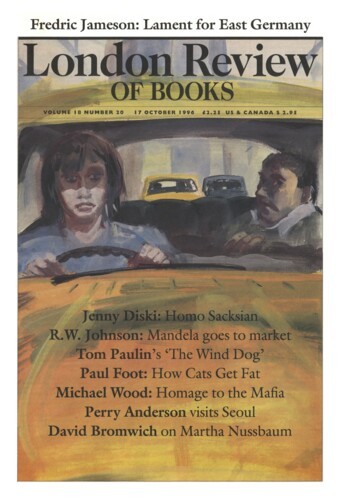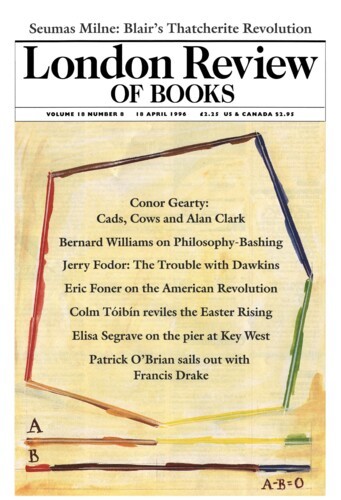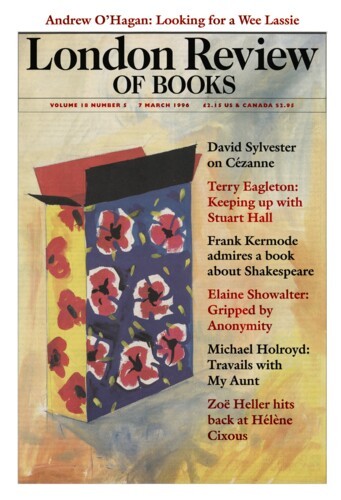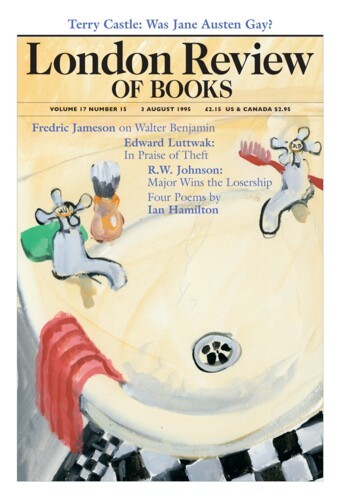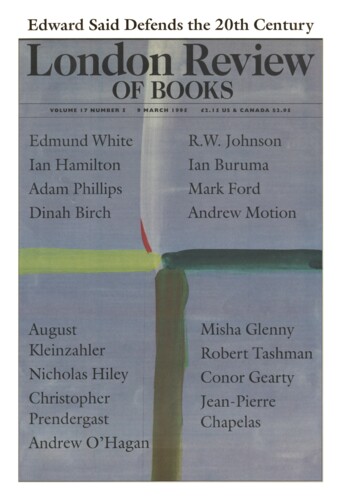Getting to Tombstone
Dinah Birch, 17 October 1996
Volumes of short stories do not get into the bestseller lists, but Georgina Hammick’s first collection. People for Lunch (1987), did so at once. It can hardly have been the subject-matter: the stories are not especially violent or sexually inventive, nor do they offer revisionary analyses of late 20th-century culture. Anything quite exceptional, magic or grotesque is not their business. Nor is romantic reassurance. The voice is usually middle-class, the perspective often that of a harassed woman, struggling with wayward adolescent children, remembering youth and beginning to sense advancing age. Drinking, smoking and dogs get a sympathetic mention. Her next collection, Spoilt (1992), continued in like vein, contemplating loyalty and betrayal, maternal anxiety, family secrets and jokes, dreadful parties. Hammick has sharp eyes and even sharper ears, and a remarkable ability to write as people speak, to themselves and to others. This can make her a very funny writer, with a rare facility for reproducing the private comedies which keep families going. More often, it makes her unsettling. Her fiction insists on confrontations with discomfort, un-softened by glamour. She distrusts the consoling strategies of fantasy. To read her account of a dentist’s poisoned erotic fancies (‘Bad Taste’), or a bank clerk picturing the death of his wife (‘Deathcap’) is to be brought up hard against the clamorous needs of the imagination, and its power to corrupt. In ‘The Wheelchair Tennis Match’, a fearful mother (‘Bald tyres and a drunken or sleepy coach driver, an overweight coach driver all set to have a heart attack at the wheel … Driving too fast, falling asleep’) paralyses her relations with her family with her excessive fretting. Not, the story bleakly suggests, that she worries without reason. No one in these stories is wholly right or entirely wrong; no one is blamed, elevated to heroism or granted the charisma of villainy. ‘Noble Rot’, a story about English social class, undermines preconceptions with unobtrusive relish. Cicely, a modern lady of the manor, impulsively rescues an elderly couple having a miserable picnic on a busy lay-by, and sweeps them away for an afternoon’s entertainment in her very sophisticated garden. Cicely is generous and cultivated: so is her family. Arnold and Gladys behave with the awkwardness that might be expected under such circumstances. The satire seems to be of a recognisable type. But complications and questions are deftly accumulated. Cicely’s teenage children reveal themselves to be polished incompetents. Arnold and Gladys are capable, solidly aware of their worth, unfazed by this sudden glimpse of wealth and style. Their grandchildren are creative, doing well; the heirs to the manor are going nowhere. Yet the writing acknowledges and admires the charity and grace that led to Cicely’s eccentric invitation.
